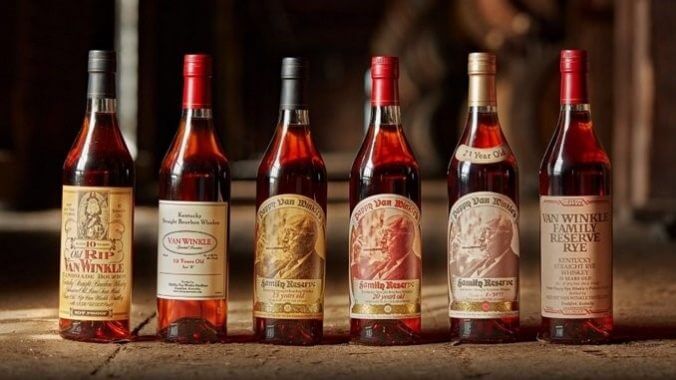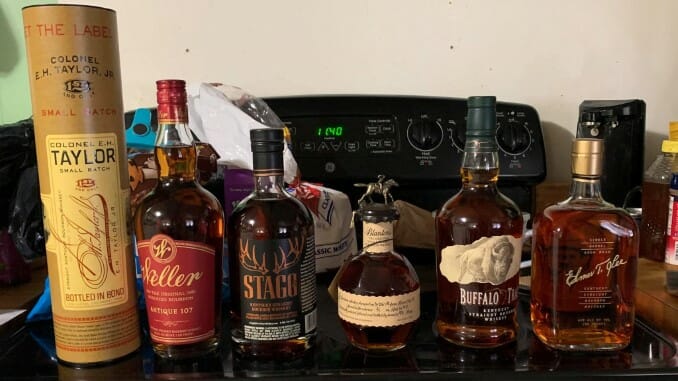We Shouldn’t Be Surprised When Liquor Commissions Skim Rare Bourbon For Themselves
Photos via Buffalo Trace, Sazerac Co.
This week, the Oregon whiskey world found itself having a bit of a conniption, as a story emerged that those workers overseeing the state’s liquor industry—the Oregon Liquor and Cannabis Commission—had for years been using their connections to the state apparatus to snap up rare and valuable bottles of bourbon for themselves. Nor was this some kind of isolated scheme cooked up by a few enterprising employees—rather, it seems like employees throughout the organization, on every level, had for years been using their access to obtain sought-after brands such as Buffalo Trace’s Pappy Van Winkle or Elmer T. Lee, and the behavior was more or less condoned. Even employees like the now-dismissed, long time executive director Steve Marks and his direct subordinates were happily receiving occasional bottles of stuff as rare as the likes of Pappy Van Winkle 23 Year Bourbon.
For the sake of a bit of context: You’re probably aware that all Pappy Van Winkle bourbon has been extremely difficult to come by for the last few decades, but even with the brand this rarity is stratified by tiers. There is much, much less Pappy 23 Year than any other bottle in the series. In a recently announced lottery of Virginia ABC liquor stores for Pappy bottles, there are a grand total of five bottles available in 2023, for the entire state. Five. That’s it. And like Virginia, Oregon is a “control state,” in which the state government controls distribution and retail of spirits.
Odds the general public could win a fancy bottle of coveted Pappy’s 23-year-old reserve in an @OLCC lottery?
1 in 5,373, or 0.02%.
Odds you could score the same bottle if you ran the state agency regulating liquor?
100%.
Read @noellecrombie’s story: https://t.co/Lezeu84YL2pic.twitter.com/6jBzJjKwdw
— Brad Schmidt (@_Brad_Schmidt) February 9, 2023
With that in mind, it’s perhaps easy to imagine the reaction of Oregon whiskey geeks to the news that OLCC employees had been skimming off the top in this way: blind, frothing rage. Commentary quickly piled on Marks, a man with an annual salary of more than $222,000, using his connections to score rare whiskey. On Wednesday, Oregon Gov. Tina Kotek sent a letter to members of OLCC, saying that she became aware of its internal investigation into the matter after having already asked Marks to step down, but she made a special point of lambasting employees of the agency further, saying: “This behavior is wholly unacceptable. I will not tolerate wrongful violations of our government ethics laws.” She went on to urge the commission to “install new leadership and remove the managers and executive leadership who have taken advantage of their access and authority to benefit themselves.” As of now, the vast majority of the employees involved, except for Marks, remain in their positions.
As a whiskey enthusiast, it’s easy to understand the root of the rage that Oregon’s consumers are feeling. It’s the ultimate result of the pool of passionate whiskey geeks having grown so large that it far outstrips the supply of what is desired, with problems compounded both by both real and artificial scarcity enforced by the distilleries/parent companies, and a culture that has often become toxic in its obsession with whiskey from just a few notable sources. The people most consumed by anger are no doubt the ones who have most fully given in to bourbon tunnel vision, shunning all other spirits in a single-minded quest to obtain status symbols for their whiskey shelf (where they can sit unopened for years). But even if that’s the case, you can’t really blame a collector for being pissed off if the executive director of your state’s liquor commission swoops in to claim one of the only bottles of Pappy 23 to make it into your city. Entitled or not, the situation is ripe for rage.
With that said … none of this should be the least bit surprising. In fact, it should be the expectation, not just in Oregon but in practically any state or city, even ones that aren’t control states where the government runs the liquor operations. People with access to rare bourbon are going to use that access to obtain rare bourbon for themselves and others. And the fact of the matter is, that I don’t believe for a second that most of the angry consumers wouldn’t do the same, if they were working for the state liquor commission. Indeed, what likely motivates a person to work for a state liquor commission in the first place, if not an appreciation for fine spirits? Is access to those spirits not more or less a fringe benefit that is heavily implied, if not outright stated, when one begins the job? Do you really expect the executive director of a state liquor commission to have the same level of access to liquor as someone walking into a package store off the street?
It’s important to note: These bottles were not being stolen. They were bought and paid for by OLCC employees, as the scheme just involved diverting those bottles from warehouses to be held at liquor stores, where the employees could visit and make the purchase. As such, it’s questionable whether anything genuinely “illegal” really happened—obviously it’s a rather unethical use of insider knowledge, which deprives customers of a heavily desired product, but in the eyes of the law the actions of these employees are notably less thorny than the average whiskey geek buying or selling bottles on the expressly illegal secondary market. What’s the bigger problem: OLCC employees using their connections to buy a bottle for themselves, or a local bourbon geek buying the same bottle in stores and then reselling it for 500% MSRP to another collector online, three states over?
 A classic post of the “Look at all these Buffalo Trace bottles I purchased and arranged on my oven, and am willing to resell to you at vastly marked up prices” variety.
A classic post of the “Look at all these Buffalo Trace bottles I purchased and arranged on my oven, and am willing to resell to you at vastly marked up prices” variety.
Applied to other industries, this kind of scrutiny might well seem absurd. If someone working the supermarket butcher counter, for instance, claims a prime cut of beef for himself or his friend, do we insist that he should have put that beef in the display case, to allow customers a chance to buy it instead? Or would we just accept this as a perk of the guy working directly with beef, unlike the rest of us?
That kind of comparison might not hold water, though, for one reason that ultimately clouds the entire conversation around American whiskey, which is the idea of valuation and secondary market value. This is the Achilles heel of U.S. bourbon, and the reason why foul play is the unavoidable expectation for people involved with it—the fact that rare bourbon has a street value that far exceeds its sticker value. If that butcher puts aside a prime steak for his daughter’s boss, that guy can’t receive the steak and then trade it for something else, or flip it for 5X profit. But because absurd secondary market prices continue to be the norm in bourbon—fueled by desperate, status-seeking consumers who continue to pay those prices—the mania is unable to subside. And thus, the temptation is always going to be there for those with connections to utilize them to obtain rare bourbon.
Naturally, employees of the OLCC in Oregon who had used their connections to buy rare bourbon universally insisted in the ensuing investigation that they had kept those bottles for themselves, for their own personal consumption. With that said, would you really expect them to say anything else in that situation? One would hope that employees of a liquor commission would be quite well aware of why it’s a bad idea to sell divert and sell the alcohol they work with in their job, but it’s not as if that has stopped it from happening in the past.
In my own state, in fact, a somewhat similar—honestly more serious—scenario played out last year, when a Virginia ABC employee and an acquaintance were both indicted in a scheme to use insider knowledge of ABC shipping schedules to profit off the desperation of the state’s local bourbon geeks. Allegedly, the ABC employee used his access to an internal list of allocated liquor products (overwhelmingly bourbon), which stated which bottles would be sent to which stores, and provided that information to his partner. The partner then established a private Facebook page and charged Virginia bourbon collectors $300 each for access to his regular supplies of information, informing them where bottles would be. The resulting scandal so rocked the seemingly always fraying ABC so badly that they completely redesigned the system for how allocated spirits products would be sold, instituting a newly randomized system that sends out emails at random times to subscribers, letting them know if their store has rare bottles to sell. It’s not a perfect system, and there are still opportunities for those in the ABC to theoretically peddle their influence, but many of the state’s whiskey geeks have seemed to begrudgingly state that the current system is an improvement.
At the end of the day, it’s that kind of organized, conspiratorial fraud that represents the biggest current threat to the rank and file whiskey drinkers who are hoping against hope to stumble across rare bottles of bourbon on a store shelf. Is it ideal that those who work in the whiskey industry are no doubt using their connections to obtain whiskey in likely every state? I guess so, but it’s to be expected when the product still has such an unsustainable air of hype around it. If you’re still seething, then maybe consider the possibility, as I’ve so often suggested, that the best overall response here might be to simply diversify your drinking, exploring the incredibly wide and delicious world of spirits outside of one or two styles of American whiskey.
It’s a big spirits world out there, folks. If the shady aspects of American whiskey get you down, perhaps it wouldn’t hurt to think beyond bourbon?
Jim Vorel is a Paste staff writer and resident liquor geek. You can follow him on Twitter for more drink writing.







































